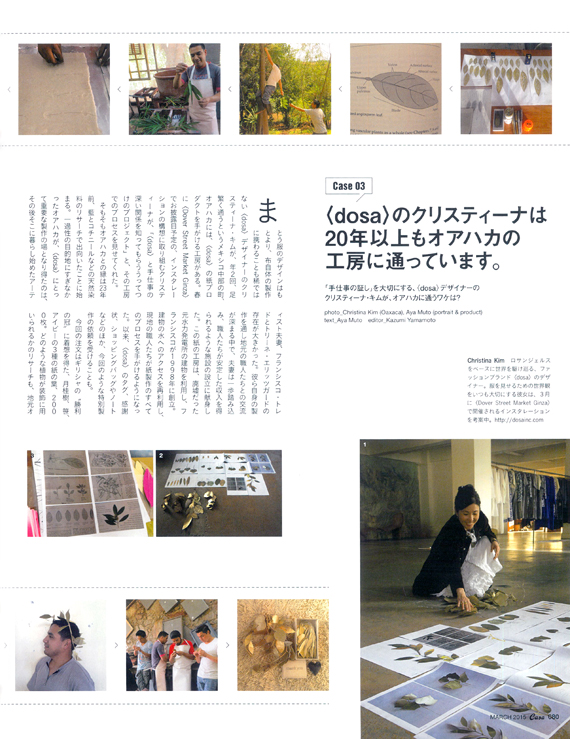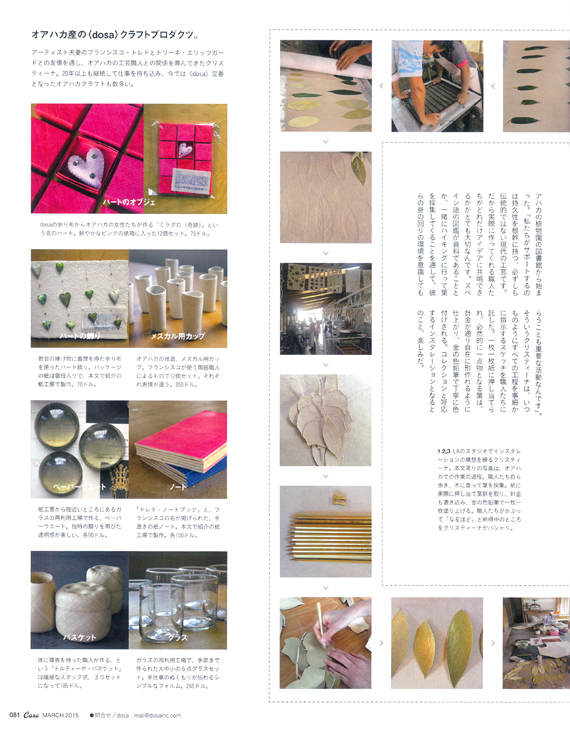Casa Brutus
Casa Brutus
Life with Folk Art
March 2015
Christina Kim is the owner and designer of fashion brand dosa. Kim is based in Los Angeles while she flies around the world working on collections and projects. She values seeing and understanding the contexts in which all garment designing takes place. At the time of this article, Kim was working on an installation for Dover Street Market Ginza, which opens in March.
Christina of dosa has been working with Oaxacan workshops for more than 20 years. Why does dosa designer Christina Kim, who values “signs of hand work," keep going back to Oaxaca?
dosa designer Christina Kim is known to design garments, but to also develop the textile itself is not uncommon for her. With such devotion to her art, it intrigues us to learn there is a paper-making workshop, located in the city of Oaxaca in central Mexico, that makes all of dosa’s paper products. While working on an installation for Dover Street Market Ginza that was set to premiere in the spring, Christina explained how it would be a perfect project to show the deep relationship between dosa and handcrafts. Here is the process she shared with us.
Twenty-three years ago, Christina first traveled to Oaxaca to research natural dyes such as indigo and cochineal. It might have become just one transient destination, but the relationship she later developed with Trine Ellitsgaard and her husband, Francisco Toledo, became the anchor for further involvements in the area. The couple, artists who worked with local artisans to fabricate their work, eventually would go on to establish institutions that provided stable means of income for the local community. This paper workshop is one such place. Francisco repurposed an abandoned water power plant in 1998. Utilizing the structure’s access to water, he worked on its infrastructure so that local artisans would be able to handle the entire paper-making process there at the plant. dosa’s tags, thank you notes, shopping bags, and notebooks have been made there ever since. Once in a while, the workshop will take on a special order such as this project Christina brought in.
The [Dover Street Market Ginza] project was to make 2000 paper leaves (bay laurel, bamboo, and ivy) inspired by the idea of Greek victory crowns. Christina’s research in figuring out what kind of foliage had been traditionally used began purposely in the library of Oaxaca’s botanical museum [Jardín Etnobotánico de Oaxaca]. “What we support is a contemporary craft based on sustainability, and not necessarily a traditional craft. So, for artisans to be able to relate to an idea is very important. For example, my using a Spanish language encyclopedia as reference, or going on a hike to forage the material together — I value these processes that help them become more aware of their own environments.”
To explain, Christina shared her detailed hand drawn sketches of each process, which were, in fact, Xerox copies; the originals she left with the Oaxacan artisans. Each paper leaf is made with an actual leaf imprint, so naturally it becomes a one-of-a-kind craft. Wire used to shape the leaves is molded into the paper. The leaves are then colored one by one with gold pencil. This eventually will be part of a larger installation that involves the dosa collection. Now that’s something we can look forward to.
dosa products made in Oaxaca
corazon milagro
Made from dosa textile scraps, Oaxacan women make these little hearts called “miracle/milagro”. Comes in a bright pink paper box, set of 12. $75
corazon milagro ornaments
Inspired from the offerings at Oaxacan churches, these heart objects are made entirely with dosa textile scraps. Paper packaging contains mica and is made at the paper workshop introduced in this story. $70
mezcal cups
Mescal is a regional alcohol of Oaxaca. Developed with the ceramic artisan with whom Francisco works. Each cup is one-of-a-kind. Set of 12. $350
paper weight
Not so far from the paper workshop is a recycled glass factory that makes these paper weights. The unique shade captured in the glass is simply beautiful. $90 ea
notebook
This sketchbook is called “Toledo Notebook,” an obvious nod to what Francisco has established. Also made at the paper workshop introduced in this story. $100 ea
basket
Made by a disabled artisan, these finely woven “tortilla baskets” are stackable. Set of 3, $185
glass
Hand blown at the recycled glass factory, these glasses come in a pair of 3 sizes: large, medium, and small. Each has a slightly different form, a beautiful sign of handwork. Set of 6, $265
photo: Christina Kim, Aya Muto
text: Aya Muto
editor: Kazumi Yamamoto
english translation: Aya Muto

Christina working on the installation idea at her L.A. factory studio. The images around the main text show stages of the process at the paper-making workshop. Artisans themselves went on a hike and climbed trees to forage needed foliage. Pressing actual leaves onto paper and embedding a thin wire to form a shape, the paper leaves take on life, eventually getting finished with gold pencil. One of the artisans tried out a mock-up victory crown, and Christina was right there to document his moment of “a-ha!”

Through her friendship with artist couple Francisco Toledo and Trine Ellitsgaard, Christina continues to nurture a long lasting relationship with Oaxacan craftspeople. For more than 20 years, she has been bringing in steady orders for products, many of which are now dosa standards.